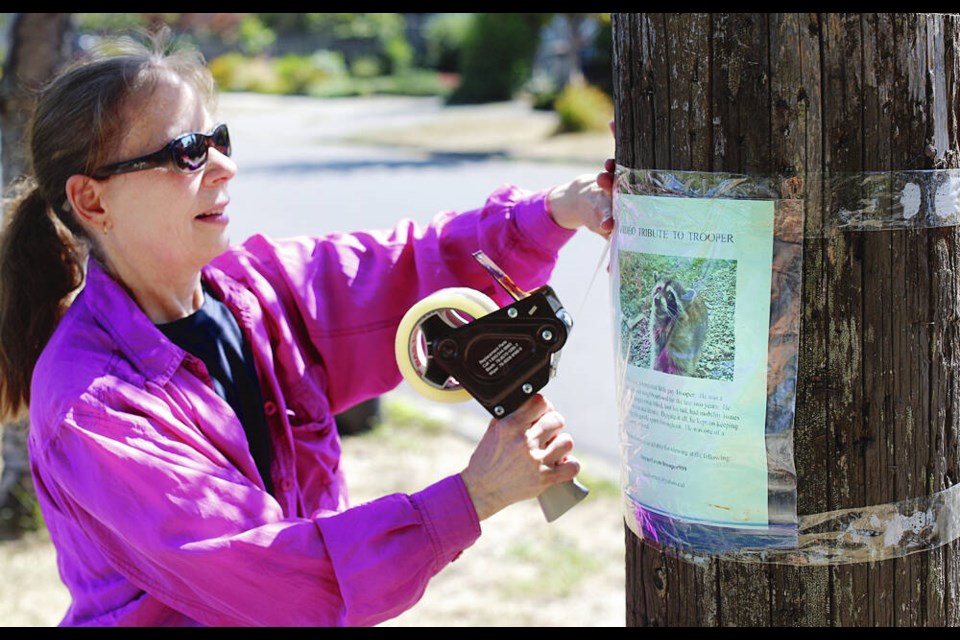He was blind, mild-mannered, had a stub of a tail and walked with a lumbering gait. That’s how Trooper the raccoon was described on missing posters posted around Fairfield.
He wasn’t missing in the traditional sense — he didn’t belong to anyone — but he was absent from his regular routine, visiting homes in the neighbourhood where he had come to be known.
So when Linda, a Victoria resident who had been watching Trooper for more than two years, didn’t see him for a few weeks, she put the posters up hoping to find out where the raccoon had gone.
She heard from about a dozen others who, like her, had enjoyed seeing Trooper frequently, but no one recalled seeing him recently. When her missing poster was shared on Reddit, several people commented to say they knew him too. One called him Oscar. Another became so smitten that they drew a portrait of him.
With no new sightings for weeks, Linda replaced the missing posters with a new version: in fond remembrance.
“We miss seeing his cute little face and the way he would press up against the back door, listening for our movements inside (ever hopeful for grapes). We also miss seeing him sleeping in the back yard on warm days,” Linda wrote. “Our world is an emptier place without Trooper in it. We would like to think he is somewhere, living a good life.”
Linda, who asked that her last name be withheld to protect her from online backlash, first saw Trooper on surveillance camera footage in a friend’s Fairfield yard in early 2021. She thought he had been hit by a car, because he could hardly move his back legs and his tail was badly bent. She watched him dig around for seeds and wondered how he would survive.
A couple of months later, Trooper came to the yard during the day. Linda started to put out sunflower seeds for him. She knew she shouldn’t feed wildlife, but she was worried about the raccoon because he had so many physical challenges.
His injured tail had fallen off, leaving just a stub, which made it difficult for him to balance on tree branches. Linda would watch as he clumsily climbed trees in the yard, sometimes losing his balance and clinging to the underside.
“I named him Trooper because he had so many challenges. He was blind and [had] mobility issues, but despite that all, he just kept on trucking along,” she said.
Linda would practise speaking her basic Spanish and Ukrainian phrases to Trooper. He was the perfect language partner for her, because he didn’t care if she mispronounced a word.
“He was like a little bit of joy. It really was. I don’t know any other way really to describe it,” she said.
Now that Trooper is gone, Linda takes inspiration from the way he lived.
“We could all adopt that way of being in the world. This very matter-of-fact, deal with the cards you’re dealt with attitude,” she said.
Linda has now put up a third version of her poster, this time sharing a video of Trooper to honour his life.
“He lived in the neighbourhood for just over two and a half years. It was his home. And I wanted people to know that his life had mattered to someone,” she said.
Linda’s is not the first memorial to a raccoon. In 2015, Toronto residents built a memorial around a raccoon found on a sidewalk after animal services failed to remove the body promptly. The sidewalk memorial featured a framed photo of a raccoon, flowers, a card, and candles. A city councillor asked residents to honour the animal, dubbed Conrad on Twitter, by leaving their green bins open for the night. Animal services removed the body after about 14 hours.
Raccoons are omnivorous and opportunistic animals that will eat “anything and everything that seems or is edible,” said Lisa Lopez, program manager at WildSafeBC.
Because they’re adaptable, they’re often found in urban settings, but it’s important to remember they are wild animals and can respond aggressively if they feel threatened by people, she said.
Anyone who finds an orphaned or injured raccoon can contact Wild ARC for care at 1-855-622-7722.
>>> To comment on this article, write a letter to the editor: [email protected]



